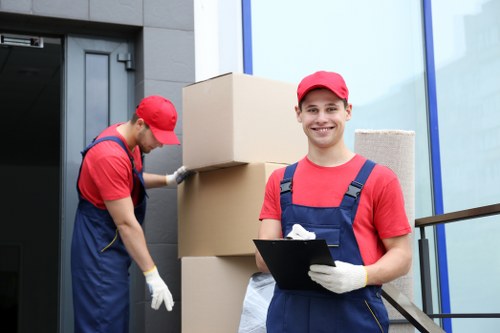Council Rubbish Collection Stevenage

The council rubbish collection service in Stevenage plays a crucial role in maintaining the town's cleanliness and ensuring a healthy environment for all residents. Managed by Stevenage Borough Council, this service is designed to handle everyday waste, recycling, and bulky items efficiently and responsibly.
Understanding the specifics of rubbish collection can help residents manage their waste better and comply with local regulations. This article delves into all aspects of the council rubbish collection in Stevenage, offering comprehensive information for homeowners, tenants, and businesses alike.
From collection schedules and what can be disposed of to recycling initiatives and special waste disposal, we cover everything you need to know to ensure your waste is handled correctly and sustainably.
Rubbish Collection Schedule

Stevenage Borough Council provides a structured rubbish collection schedule to ensure timely and efficient waste management. The schedule typically includes regular collections for general waste, recycling, and, in some cases, food waste.
General waste is usually collected once a week, while recycling collections may occur on alternate weeks or as per the specific area’s arrangement. It's essential for residents to know their designated collection days to avoid missed pickups or fines.
Schedules can vary based on the type of collection and the specific area within Stevenage. The council's website offers an interactive tool where residents can check their collection dates by entering their postcode.
General Waste Collection
General waste refers to non-recyclable household items that cannot be disposed of through regular recycling programs. Items typically include food waste, tissues, disposable nappies, and certain types of packaging.
Residents must use appropriate bins or bags provided by the council to ensure their waste is correctly collected. It's also important to avoid overfilling bags and to securely close bin lids to prevent spillage or pests.
In some areas, bulky waste items, such as furniture or appliances, are collected separately on designated dates or can be arranged through a special service.
Recycling Collection
Recycling is a key component of Stevenage's waste management strategy. The council encourages residents to separate recyclables from general waste to reduce landfill usage and promote environmental sustainability.
Common recyclable items include paper, cardboard, plastics (with certain exceptions), glass bottles, and metal cans. These should be placed in designated recycling bins or containers provided by the council.
Proper sorting is essential to ensure that recyclables are effectively processed. Contaminated or improperly sorted items can disrupt the recycling process and may be diverted to general waste.
Bulky Waste Collection

Bulky waste refers to large items that cannot be disposed of through regular rubbish collection due to their size or weight. This includes furniture, white goods, electronics, and garden waste.
Stevenage Borough Council offers a bulky waste collection service, typically available a few times a year. Residents must book a specific collection slot in advance to ensure their items are picked up.
Alternatively, residents can take their bulky waste to approved recycling centers or arrange for a private waste removal service if they prefer immediate disposal.
How to Book Bulky Waste Collection
- Visit the Stevenage Borough Council website.
- Navigate to the waste and recycling section.
- Select the bulky waste collection service.
- Provide necessary details, including address, type of items, and preferred collection date.
- Confirm and schedule the collection.
Alternative Disposal Methods
If the council's bulky waste collection service is unavailable or inconvenient, residents have other options:
- **Recycling Centers:** Drop off items at designated recycling centers in Stevenage.
- **Retailer Take-Back Schemes:** Some retailers offer take-back services for large appliances and electronics.
- **Private Waste Removal Services:** Hire a licensed waste carrier to collect and dispose of bulky items.
Recycling Initiatives

Stevenage Borough Council is committed to promoting recycling and reducing the overall waste footprint of the community. Various initiatives and programs support these goals by encouraging residents to participate actively in recycling efforts.
These initiatives include educational campaigns, provision of recycling bins, and the implementation of advanced recycling technologies to improve the efficiency and effectiveness of waste processing.
By fostering a culture of recycling, Stevenage aims to minimize landfill use, conserve natural resources, and contribute to a greener, more sustainable environment.
How to Recycle Effectively
- **Sort Your Waste:** Separate recyclables from general waste accurately.
- **Use Correct Bins:** Utilize the bins provided by the council for different types of recyclables.
- **Clean and Dry:** Ensure that recyclable items are clean and dry before disposal.
- **Remove Labels:** For plastics and glass, remove labels and caps if required.
- **Stay Informed:** Keep up-to-date with the council's recycling guidelines and changes to collection schedules.
Special Recycling Programs
The council offers specialized recycling programs for items like electronics, batteries, and hazardous waste. These programs ensure that such materials are handled safely and recycled appropriately, preventing environmental contamination.
Residents can participate by following the specific guidelines for each type of waste and utilizing designated drop-off points or collection events organized by the council.
Hazardous Waste Disposal

Hazardous waste includes materials that are potentially harmful to human health or the environment, such as chemicals, paints, batteries, and medical waste.
Stevenage Borough Council provides specific disposal routes for hazardous waste to ensure it is managed safely and in compliance with environmental regulations. Improper disposal of hazardous waste can lead to serious environmental and health consequences.
Residents must adhere to the council's guidelines for hazardous waste disposal, which often involve designated collection events or specific drop-off locations.
Types of Hazardous Waste
- **Chemicals and Solvents:** Including paints, varnishes, and cleaning agents.
- **Batteries:** Both household and automotive batteries.
- **Electronics:** Items like old computers, TVs, and phones.
- **Medical Waste:** Including latex gloves, syringes, and expired medications.
- **Fluorescent Lamps:** Such as LED and compact fluorescent bulbs.
Safe Disposal Practices
To dispose of hazardous waste safely, residents should:
- **Store Properly:** Keep hazardous materials in their original containers with labels intact.
- **Do Not Mix:** Avoid mixing different types of hazardous waste.
- **Use Designated Channels:** Utilize the council’s hazardous waste disposal services or designated drop-off points.
- **Follow Instructions:** Adhere to the specific disposal instructions provided by the council.
Penalties for Non-Compliance
Failure to comply with Stevenage Borough Council's rubbish collection regulations can result in penalties. These rules are in place to ensure efficient waste management and protect public health and the environment.
Common penalties include fines for illegal dumping, missing scheduled collections, or improperly sorted waste. It is crucial for residents to familiarize themselves with local waste disposal rules to avoid these penalties.
The council may also enforce take-back schemes for certain types of waste, making it mandatory for residents to use approved disposal methods.
Common Violations
- **Illegal Dumping:** Disposing of waste outside designated areas.
- **Missed Collections:** Failure to place bins out on scheduled collection days.
- **Improper Sorting:** Incorrectly sorting recyclables and general waste.
- **Overfilling Bins:** Exceeding bin capacity and causing spillage.
- **Ignoring Bulky Waste Guidelines:** Disregarding rules for disposing of large items.
How to Avoid Penalties
Residents can avoid penalties by:
- **Following the Schedule:** Ensuring bins are placed out on the correct days.
- **Sorting Waste Properly:** Adhering to recycling and general waste guidelines.
- **Participating in Council Initiatives:** Engaging in recycling programs and bulk waste collections.
- **Staying Informed:** Keeping up with any changes in waste collection policies.
Recycling Centers and Drop-Off Points
For items that cannot be collected through regular rubbish services, Stevenage Borough Council has established several recycling centers and drop-off points. These facilities are equipped to handle a wide range of waste materials, ensuring they are recycled or disposed of safely.
Residents are encouraged to utilize these centers for disposing of hazardous, bulky, or specialized waste. Using designated facilities helps maintain community cleanliness and supports environmental sustainability initiatives.
Locations are strategically placed across Stevenage to ensure easy access for all residents, making it convenient to manage and dispose of various types of waste.
Key Recycling Centers in Stevenage
- Dane Park Recycling Centre: Offers services for general and hazardous waste.
- Ridgeway Eco Centre: Specializes in electronic waste and large appliances.
- Bernards Heath Recycling Facility: Handles garden waste and bulky items.
- Hayes Bottom Waste Transfer Station: Provides a wide range of disposal options.
- Cannons End Recycling Depot: Focuses on paper, plastics, and metals.
Using Drop-Off Points
Drop-off points are available for specific types of waste, such as:
- **Battery Recycling Bins:** Located in public parks and community centers.
- **Electronic Waste Bins:** Found near shopping areas and schools.
- **Garden Waste Bins:** Available in local parks and green spaces.
Residents should ensure they deposit their waste in the correct bins to facilitate proper recycling processes.
Tips for Effective Rubbish Management
Managing rubbish effectively not only helps keep Stevenage clean but also supports environmental conservation efforts. Here are some practical tips for residents:
Adopting good waste management habits can significantly reduce the amount of waste produced and improve the efficiency of the council's collection services. Simple actions taken at home can make a big difference in the overall waste landscape of the community.
Implementing these strategies can lead to a more organized, cleaner, and more sustainable environment for everyone in Stevenage.
Reduce, Reuse, Recycle
The classic mantra of waste management remains highly effective. By reducing the amount of waste you produce, reusing items when possible, and recycling properly, you contribute to a more sustainable town.
Composting
Composting organic waste like food scraps and garden waste can significantly reduce the volume of rubbish going to landfills. It also produces valuable compost that can be used to enrich soil in gardens and parks.
Proper Sorting
Accurately sorting your waste ensures that recyclable materials are not contaminated and can be processed efficiently. Pay attention to the council's guidelines on what belongs in each bin.
Local Relevance: Nearby Areas to Stevenage
Stevenage is surrounded by several nearby areas, each with its unique characteristics and proximity to the town. Understanding the rubbish collection services in these areas can be helpful for residents living on the outskirts or those who travel between different communities.
Here are some of the closest areas to Stevenage that benefit from the council's rubbish collection services:
- Berkhamsted: Located approximately 5 miles west of Stevenage, Berkhamsted offers coordinated waste collection services and has additional recycling centers.
- Letchworth: Situated about 6 miles south of Stevenage, Letchworth benefits from similar rubbish collection schedules and access to local disposal facilities.
- Knebworth: Just 4 miles north, Knebworth residents can utilize Stevenage's recycling centers for their waste disposal needs.
- Walsworth: Located 3 miles east, Walsworth has integrated waste management services with Stevenage, ensuring seamless rubbish collection.
- Abbey Green: Approximately 2 miles southeast, Abbey Green relies on Stevenage Borough Council for all their waste and recycling needs.
- Grange: About 3 miles south, Grange shares similar waste collection schedules and access to bulky waste services.
- Offa: Located 1 mile west, Offa benefits from immediate access to Stevenage’s recycling and disposal facilities.
- Bedwell: A short distance of 2 miles northeast, Bedwell integrates with Stevenage’s waste collection services.
- Farm Park: Situated just 1.5 miles east, Farm Park residents have convenient access to all of Stevenage’s rubbish collection services.
- Heaton: Located 2.5 miles northwest, Heaton benefits from the comprehensive waste management services of Stevenage Borough Council.
- Paketown: Approximately 3.5 miles west, Paketown residents utilize nearby recycling centers and bulky waste collection services.
- Symonds Green: About 2.2 miles southwest, Symonds Green shares waste disposal services with Stevenage’s main collection programs.
- Old Coates: Located 4.5 miles south, Old Coates residents have access to specialized waste disposal services and recycling initiatives.
- Goffs Oak: Situated 5.5 miles north, Goffs Oak benefits from coordinated waste collection schedules and local recycling facilities.
- Potter Street: Approximately 1.8 miles east, Potter Street integrates seamlessly with Stevenage’s comprehensive rubbish collection services.
Environmental Impact of Rubbish Collection
Effective rubbish collection is vital for minimizing the environmental footprint of a community. Proper waste management practices help reduce landfill usage, lower greenhouse gas emissions, and conserve natural resources.
Stevenage Borough Council's rubbish collection services are designed with environmental sustainability in mind. By promoting recycling, responsible disposal of hazardous materials, and the reduction of general waste, the council contributes significantly to environmental conservation efforts.
Residents play a crucial role in this ecosystem by adhering to waste management guidelines and participating actively in recycling programs.
Reducing Landfill Use
Minimizing the amount of waste sent to landfills helps preserve land resources and reduces the environmental impacts associated with landfill sites, such as soil and water contamination.
Lowering Greenhouse Gas Emissions
Proper waste management, particularly recycling and composting, can significantly reduce greenhouse gas emissions by diverting organic waste from landfills and lowering the need for raw material extraction.
Conserving Natural Resources
Recycling conserves valuable natural resources by reprocessing materials like paper, plastic, and metals, reducing the need for new raw materials and supporting sustainable consumption practices.
Community Involvement and Education
Community involvement is essential for the success of rubbish collection and recycling initiatives. Stevenage Borough Council actively engages with residents through educational programs, workshops, and public awareness campaigns.
These efforts aim to inform the community about the importance of proper waste management and provide practical guidance on how to participate effectively.
By fostering a culture of responsibility and sustainability, the council encourages residents to take ownership of their waste management practices, leading to a cleaner and healthier environment for all.
Educational Programs
- **Waste Reduction Workshops:** Teaching residents how to minimize waste production.
- **Recycling Education:** Providing information on proper sorting and recycling techniques.
- **Community Clean-Up Events:** Encouraging collective efforts to clean and maintain public spaces.
Public Awareness Campaigns
Awareness campaigns play a key role in changing waste disposal behaviors. The council uses various platforms, including social media, local newspapers, and community bulletin boards, to disseminate information about waste management practices and upcoming collection schedules.
Future Developments in Rubbish Collection
Stevenage Borough Council is continuously working on improving its rubbish collection services to adapt to the evolving needs of the community and advancements in waste management technology.
Future developments may include the introduction of more efficient recycling technologies, expanded collection services, and enhanced community engagement programs to further reduce the town's waste footprint.
These initiatives aim to create a more sustainable and environmentally friendly waste management system that benefits both residents and the broader ecosystem.
Advanced Recycling Technologies
Investing in cutting-edge recycling technologies can enhance the efficiency and effectiveness of waste processing, enabling higher recycling rates and better resource recovery.
Extended Collection Services
Expanding collection services to include more types of waste or increasing the frequency of collections can better meet the needs of a growing community.
Enhanced Community Engagement
Strengthening community engagement through innovative programs and increased outreach can foster greater participation in recycling and waste reduction efforts.
Conclusion
Council rubbish collection in Stevenage is a well-organized and essential service that supports the town's cleanliness, health, and environmental sustainability. By understanding the collection schedules, properly sorting waste, and participating in recycling initiatives, residents can contribute significantly to a cleaner and greener Stevenage.
Continuous efforts by the council to improve waste management practices, combined with active community involvement, ensure that Stevenage remains a vibrant and sustainable place to live.
Adopting good waste management habits today will lead to a healthier environment for future generations, making every effort worthwhile.
Frequently Asked Questions
1. How do I find out my rubbish collection day in Stevenage?
You can find your rubbish collection day by visiting the Stevenage Borough Council website and using their interactive tool. Simply enter your postcode to receive detailed information about your collection schedule.
2. What items are accepted in Stevenage's recycling program?
Stevenage's recycling program accepts paper, cardboard, certain plastics, glass bottles, and metal cans. It's important to check the council's guidelines for any specific restrictions or requirements.
3. How can I arrange for bulky waste collection in Stevenage?
You can arrange for bulky waste collection by booking a slot through the Stevenage Borough Council website. Provide details about the items you wish to dispose of and choose a convenient collection date.
4. Are there penalties for improper rubbish disposal in Stevenage?
Yes, there are penalties for improper rubbish disposal, including fines for illegal dumping, missing collections, and improper sorting of waste. It's essential to follow the council's waste management guidelines to avoid these penalties.
5. Where can I dispose of hazardous waste in Stevenage?
Hazardous waste should be disposed of at designated recycling centers or during special collection events organized by Stevenage Borough Council. Check the council's website for specific locations and disposal guidelines.
Frequently Asked Questions
Stevenage Council Waste Management utilizes state-of-the-art equipment and eco-friendly methods to ensure efficient and safe rubbish collection. Our local experts are trained to handle various types of waste, providing reliable and thorough service. Contact our Stevenage team for a quick quote.
Yes, Stevenage Council Waste Management holds accreditations from leading industry bodies, ensuring our services meet the highest standards. Our trusted team is committed to maintaining these certifications to provide you with reliable waste management solutions.
Absolutely. Stevenage Council Waste Management is fully certified and insured, guaranteeing legal compliance and peace of mind for our customers. We prioritize safety and transparency in all our services.
Stevenage Council Waste Management proudly recycles over 98% of collected materials, demonstrating our commitment to environmental responsibility. We strive to minimize landfill waste through effective recycling practices.
With over 20 years of service in Stevenage, our team has extensive local experience and a deep understanding of the community’s waste management needs. Trust our seasoned professionals for reliable and efficient service.
Yes, Stevenage Council Waste Management offers competitive and affordable rates for all our waste collection and clearance services. We aim to provide cost-effective solutions without compromising on quality.
Safety is our top priority at Stevenage Council Waste Management. Our trained professionals use secure methods and equipment to handle and collect waste safely, ensuring the protection of both our team and the community.
Absolutely! Stevenage Council Waste Management offers same-day rubbish collection services to address urgent waste removal needs promptly. Contact our Stevenage team to arrange a quick and efficient pickup.
Stevenage Council Waste Management is dedicated to eco-friendly practices, including high recycling rates, sustainable waste processing, and minimizing environmental impact. Our commitment helps protect the Stevenage environment for future generations.
Yes, Stevenage Council Waste Management is equipped to handle specialized waste items such as electronics, hazardous materials, and bulky furniture. Our trained team ensures safe and compliant disposal of all types of waste.
Stevenage Council Waste Management prides itself on transparency, offering clear and upfront pricing with no hidden fees. We provide detailed service descriptions to ensure our customers understand exactly what to expect.
Choose Stevenage Council Waste Management for our trusted reputation, extensive local experience, eco-conscious practices, and commitment to customer satisfaction. We are your reliable partner for all waste management needs in Stevenage.




